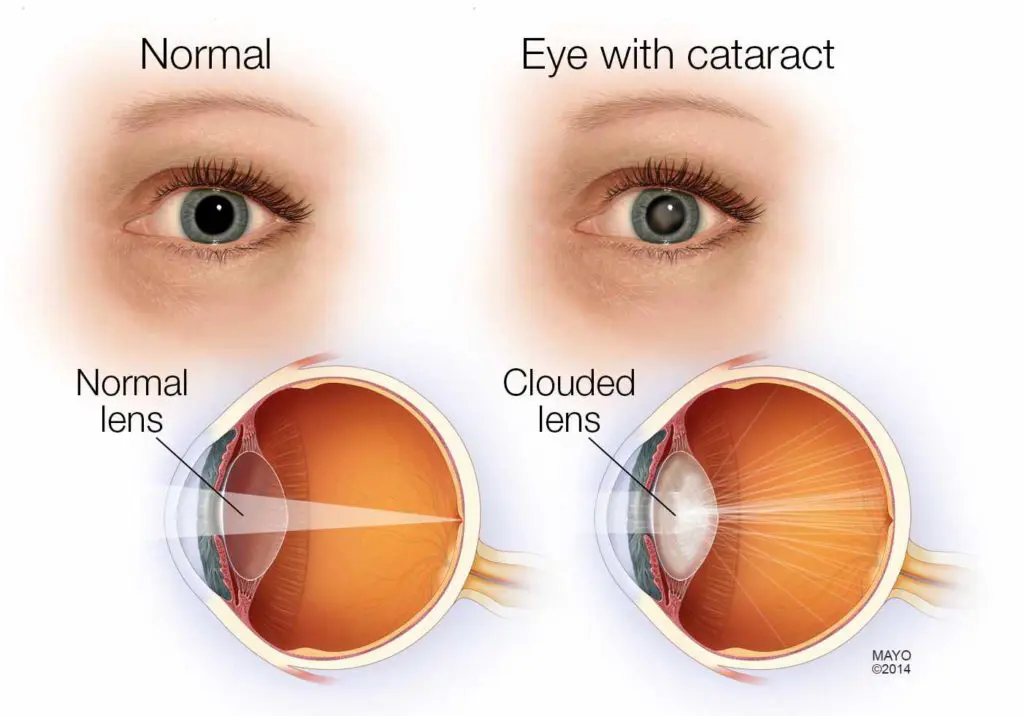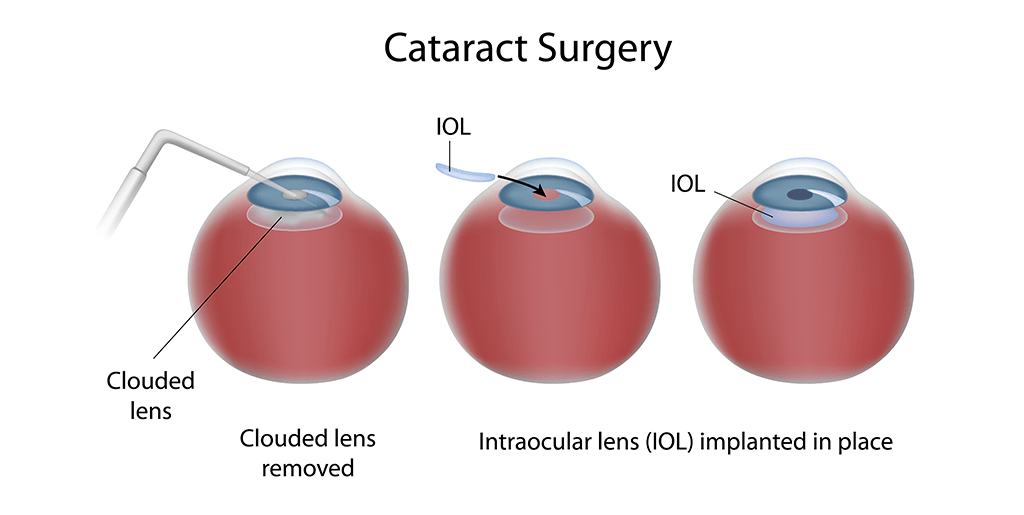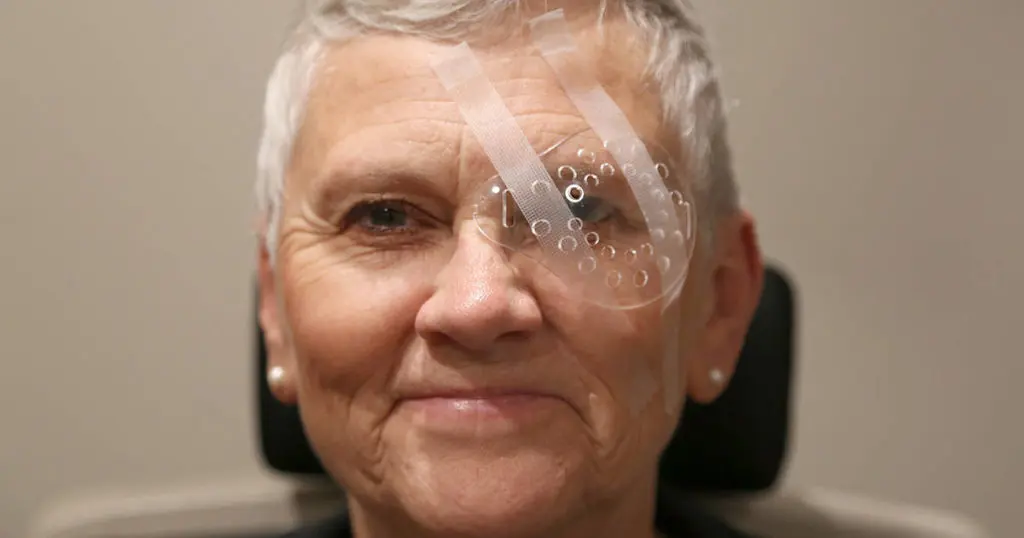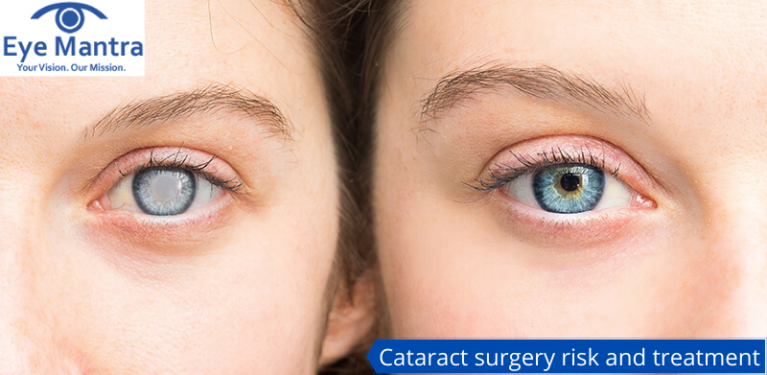Contents
What Is A Cataract?
A cataract is a condition in which an opacification of the eye lens can decrease vision. This can be treated through cataract surgery. Even though, cataract surgery is easy. It requires caution and skill to prevent any problems.
A cataract is a condition that is caused when the lens inside the eye gets cloudy and causes vision problems. This disease is usually seen in elderly people i.e., who are aged above 50 years. To clear the lens i.e., for a cataract to be treated, surgery must be performed.
An ophthalmologist (eye doctor) performs this cataract surgery. The surgeon removes the unclear or cloudy lens and replaces it with an artificial one. Cataract surgery is a safe procedure and very common these days.
A cataract can develop in different periods in different individuals as well as in both eyes of the same person.
The span of time taken to develop a cataract in an eye majorly depends on the individual itself. Since a cataract is also considered an age-related disease, it takes over a long time to develop.
There are primarily three types of cataracts are Nuclear sclerotic cataract, Cortical cataract, and also posterior subcapsular cataract.

Diagnosis of Cataract
A doctor can diagnose a cataract through an eye exam or by using an eye test to check the vision at different distances of the patient. And tonometry also helps in measuring eye pressure.
The eye pressure is tested by a painless puff of air that flattens the cornea and the eye pressure is measured. In order to check the optic nerve and retina for any damages, the use of drops that causes an increase in pupil size is helpful.
Light sensitivity to glare and colour perception are other tests which are performed to diagnose cataract.
Cataract Surgery
When the cataract creates trouble in your day-to-day activities such as driving or reading, or also when the cataract condition interferes with other eye-related problems, then cataract surgery is recommended.

There are types of surgical procedures that help in treating cataract such as-
- A method called phacoemulsification, which involves the use of ultrasound waves to break the lens apart, and pieces are removed later.
- In Extracapsular cataract surgery, the cloudy part of the lens through the long incision in the cornea. Later after the cataract surgery, an artificial lens is placed in the place of the natural lens.
- The cataract surgery takes place in an hour so the patient leaves to home on the same day and no tension is required. The surgery has a great success rate and is very safe.
Why Is Cataract Surgery Performed?
The person suffering from a cataract can show any of the following symptoms such as blurred vision, and viewing during night times can be a problem. Some people also experience fading of colours and light sensitivity and double vision in the affected eye.
So, to treat these symptoms and other eye-related problems which are followed through, cataracts are removed through cataract surgery once and for all.
There are various causes that cause cataracts which include increased production of oxidants as the oxygen molecules are chemically altered, by smoking, by ultraviolet radiation, by use of steroidal medications increases chances of getting cataract. People who have undergone severe traumatic experiences and exposure to radiation therapy are likely to get a cataract.

Risk Factors In Cataract Surgery
There is a list of risk factors in a cataract such as old age. It is a fact that cataract occurs in people who are aged, but cataract can also occur in people of young age, due to radiation or any other factors that cause cataract. Consumption of excessive alcohol and smoking increases the risk of cataracts. An increase in blood pressure and obese structure of the patients can also cause a cataract.
People who have previous eye injuries and previous family history of cataract patients have increased chances of getting cataracts. Increased exposure to sun and radiation from chemotherapy (used in cancer treatments) or X- rays causes cataracts in young people as well. Diabetic patients also come in a similar category.
Possible Complications During Cataract Surgery
During 1st week of your operation, your eye is a vulnerable part of your body. Although the success rate of operation is pretty high, you still might face some of these symptoms like pain, nausea, vision loss. If you suffer from any of these problems, go and see your surgeon right away. If you experience any sudden increase in pain on redness in your eyes, seek help. Also, reanalyze your daily routine.
The most important thing you need for your recovery phase is patience. Don’t get too excited right after your cataract surgery, you need to slowly phase into your normal daily life. While the list of precautions after a cataract operation can keep exceeding, the outcome and your recovery rate depend on how your daily routine is affecting it. Handle it with care and common sense. Avoid gatherings and places with pollution and pollen.
Case Study
A woman of age 56 had cataract surgery after she had a profound decrease of vision and took medications for treating depression and hypothyroidism. And the ocular history of the patient was not remarkable either.
The best-corrected visual acuity was 20/200 OD and refraction of -4.00 DS. The acuity of the left eye was measured to be 20/20 and refraction of -0.25D. There was a 2+ white nuclear sclerotic cataract in the right eye found while performing an ocular exam which causes more profound myopia and loss of acuity. The left eye shows cortical spoking.
So, she thought of having cataract surgery in the right eye as well as the left eye. The cataract surgery in the right eye with superior mini scleral tunnel incision was performed. Then after the cataract surgery, the patient was happy with the result.
Then, the next day she opted to perform similar surgery in the left eye. Refraction of +1.50D corrected her acuity to 20/80. So, the intraocular lens was replaced without much eye pain.
Later after the cataract surgery, the patient showed symptoms of poor vision in the left eye after a week.
Things To Remember After Surgery
Even a surgeon who is very much experienced must be cautious while performing a Cataract surgery.
Some patients even after surgery complain that they can’t drive safely at night and have blurred vision sometimes. With an acuity of 20/20 uncorrected vision in an eye, the surgery must be performed more cautiously in such eyes. People with preoperative refraction of+3.00D and also with a moderate cortical cataract, don’t have to wear glasses to see distances.
When surgery can be scheduled which is convenient to the patients and decreases their time taken from the work, shows the safety and success of modern surgery methods.
Sometimes, scheduling the next day for performing surgery in the next eye after the first is not appropriate for everyone. A gap of at least a month yields a more satisfying outcome in the second eye, after the eye.
Results
After four months of surgery, the patient’s left eye showed 20/30 acuity in the left eye uncorrected. She showed refraction of -0.25D and 20/20 vision. The patient had a regret performing the surgery on her left eye but still is satisfied. She remembers all the frustration of having a poor vision for several months after surgery.
Post Cataract Surgery Care
You can avoid risks and complications of cataract surgery if you take some precautions. Your eyes need some time to heal after the surgery. And taking precautions after surgery is as important as precautions doctors take during surgery. Your eyes are vulnerable for some time so you need to be aware of the problems you may face. One of the most common issues you will face is itchy-ness in your eyes. Avoid rubbing or touching your eyes at all costs. Don’t panic, and follow these steps after surgery to protect your eyes from any complications.

Some important precautions you can take post-operation:
Avoid Housework
Avoid any kind of housework that includes bending. Bending puts pressure on your eyes and can cause complications. You are advised to keep your house clean and dirt-free in the initial weeks of the surgery but avoid cleaning it yourself. Ask your family members or a maid for it.
Eat Healthy
As your eyes are adjusting to a new vision, provide them with all the required nutrients to heal faster and naturally. Avoid any processed food and junk food. Include protein and fiber-rich food on your plate. For example- green vegetables, eggs, and fruits. You need to keep a look at your blood sugar level, by avoiding food that is high in sugar like pasta; snacks like chips; bread, and any junk food. Increased blood sugar levels can damage blood vessels in your eyes and further delay your healing process.
Wear Eye Shields While Sleeping
One of the precautions after a cataract operation to take is to wear eye patches while you’re sleeping for some days to protect your eyes from any infection. Aside from wearing this shield, ensure to avoid sleeping on the side of the eye operated.
Avoid Heavy Exercises
Avoid any activity that can put extra pressure on your eyes like lifting heavyweights. Your eyes need a full month’s recovery and sometimes even more.
Don’t Avoid Post-Operation Appointments
This is one important step in your recovery. It’s a good thing to get to see the world again, but don’t forget to schedule a post-operation appointment with your doctor. After the surgery, your doctor will prescribe you some eye drops and medicines, your doctor will analyze your recovery rate and tell you what you should do and avoid.
Visit our website Eyemantra. To book an appointment call at +91-9711115191. Or mail us at [email protected]. Our other services include Retina Surgery, Specs Removal, Cataract Surgery, and many more.
Related Links



